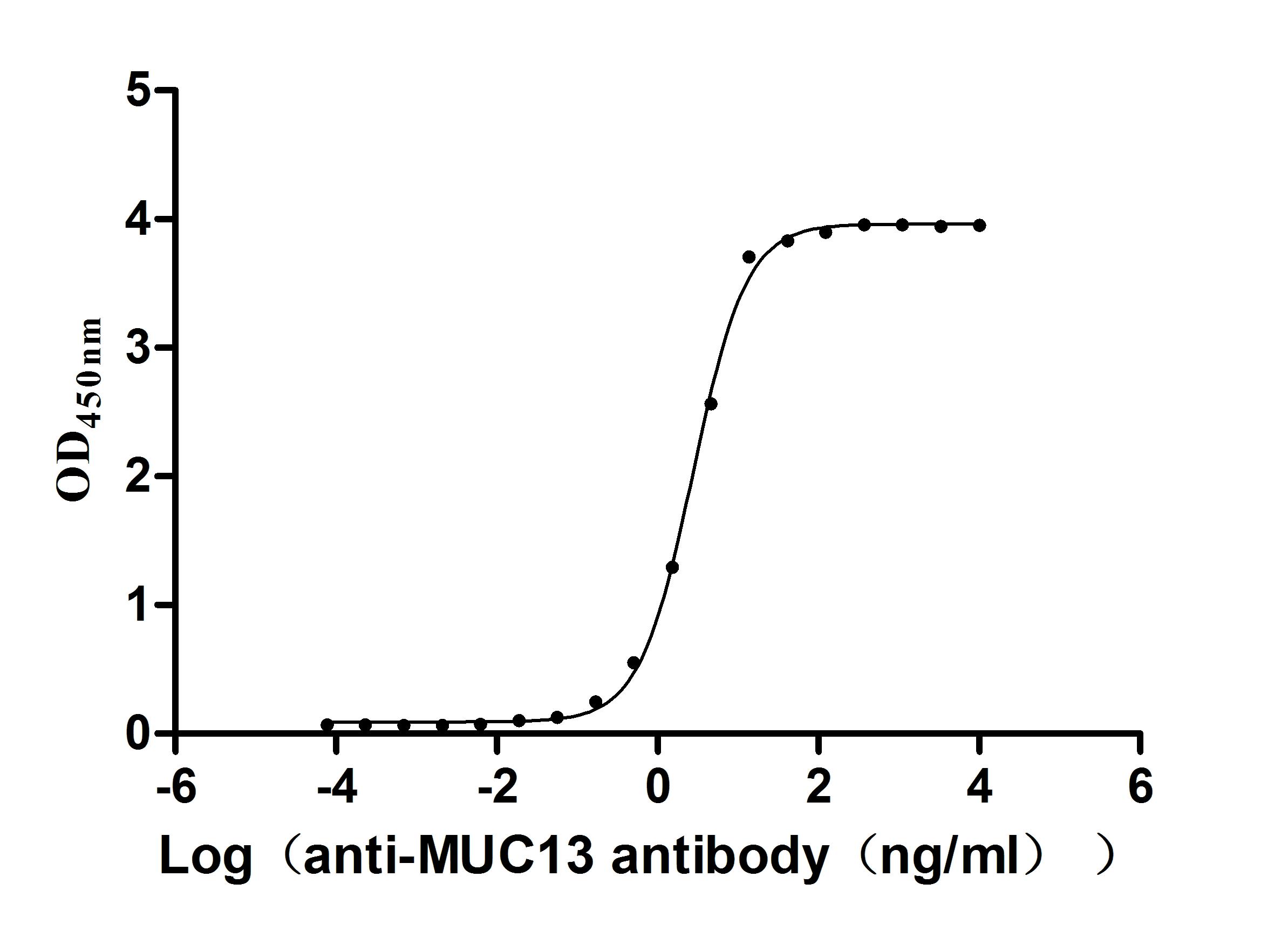Recombinant Mouse Caspase-2 (Casp2)
-
货号:CSB-YP004547MO
-
规格:
-
来源:Yeast
-
其他:
-
货号:CSB-EP004547MO
-
规格:
-
来源:E.coli
-
其他:
-
货号:CSB-EP004547MO-B
-
规格:
-
来源:E.coli
-
共轭:Avi-tag Biotinylated
E. coli biotin ligase (BirA) is highly specific in covalently attaching biotin to the 15 amino acid AviTag peptide. This recombinant protein was biotinylated in vivo by AviTag-BirA technology, which method is BriA catalyzes amide linkage between the biotin and the specific lysine of the AviTag.
-
其他:
-
货号:CSB-BP004547MO
-
规格:
-
来源:Baculovirus
-
其他:
-
货号:CSB-MP004547MO
-
规格:
-
来源:Mammalian cell
-
其他:
产品详情
-
纯度:>85% (SDS-PAGE)
-
基因名:
-
Uniprot No.:
-
别名:Casp2; Ich1; Nedd-2; Nedd2Caspase-2; CASP-2; EC 3.4.22.55; Neural precursor cell expressed developmentally down-regulated protein 2; NEDD-2; Protease ICH-1) [Cleaved into: Caspase-2 subunit p18; Caspase-2 subunit p13; Caspase-2 subunit p12]
-
种属:Mus musculus (Mouse)
-
蛋白长度:Full Length of Mature Protein
-
表达区域:170-333
-
氨基酸序列G PPCLLVKPCT PEFYQAHYQL AYRLQSQPRG LALVLSNVHF TGEKDLEFRS GGDVDHTTLV TLFKLLGYNV HVLHDQTAQE MQEKLQNFAQ LPAHRVTDSC VVALLSHGVE GGIYGVDGKL LQLQEVFRLF DNANCPSLQN KPKMFFIQAC RGDETDRGVD QQD
-
蛋白标签:Tag type will be determined during the manufacturing process.
The tag type will be determined during production process. If you have specified tag type, please tell us and we will develop the specified tag preferentially. -
产品提供形式:Lyophilized powder
Note: We will preferentially ship the format that we have in stock, however, if you have any special requirement for the format, please remark your requirement when placing the order, we will prepare according to your demand. -
复溶:We recommend that this vial be briefly centrifuged prior to opening to bring the contents to the bottom. Please reconstitute protein in deionized sterile water to a concentration of 0.1-1.0 mg/mL.We recommend to add 5-50% of glycerol (final concentration) and aliquot for long-term storage at -20℃/-80℃. Our default final concentration of glycerol is 50%. Customers could use it as reference.
-
储存条件:Store at -20°C/-80°C upon receipt, aliquoting is necessary for mutiple use. Avoid repeated freeze-thaw cycles.
-
保质期:The shelf life is related to many factors, storage state, buffer ingredients, storage temperature and the stability of the protein itself.
Generally, the shelf life of liquid form is 6 months at -20°C/-80°C. The shelf life of lyophilized form is 12 months at -20°C/-80°C. -
货期:Delivery time may differ from different purchasing way or location, please kindly consult your local distributors for specific delivery time.Note: All of our proteins are default shipped with normal blue ice packs, if you request to ship with dry ice, please communicate with us in advance and extra fees will be charged.
-
注意事项:Repeated freezing and thawing is not recommended. Store working aliquots at 4°C for up to one week.
-
Datasheet :Please contact us to get it.
靶点详情
-
功能:Involved in the activation cascade of caspases responsible for apoptosis execution. Might function by either activating some proteins required for cell death or inactivating proteins necessary for cell survival. Associates with PIDD1 and CRADD to form the PIDDosome, a complex that activates CASP2 and triggers apoptosis in response to genotoxic stress.
-
基因功能参考文献:
- A novel function for caspase-2 in myocyte differentiation and myogenesis. PMID: 28765049
- Casp2(-/-) mice, which are more susceptible to genomic instability, are limited in their ability to respond to DNA damage and thus carry more damaged cells resulting in accelerated tumourigenesis. PMID: 27518436
- BECN1/Beclin 1 binding to viral phosphoprotein (P) induced an incomplete autophagy via activating the pathways CASP2-AMPK-AKT-MTOR and CASP2-AMPK-MAPK by decreasing CASP2. PMID: 28129024
- We further generated Casp2(C320S) mutant mice to demonstrate that caspase-2 catalytic activity is essential for its function in limiting aneuploidy. Our results provide direct evidence that the apoptotic activity of caspase-2 is necessary for deleting cells with mitotic aberrations to limit aneuploidy PMID: 27991927
- These results provide the first evidence of caspase-2 in regulating haematopoietic stem cell and progenitor differentiation, as well as aneuploidy, in vivo. PMID: 27906175
- Study describes a novel pathological process in which caspase-2 cleavage of tau at Asp314 impairs cognitive and synaptic function in animal and cellular models of tauopathies by promoting the missorting of tau to dendritic spines. PMID: 27723722
- Caspase-2 deficiency protected mice from diet-induced obesity, metabolic syndrome and nonalcoholic fatty liver disease. PMID: 26890135
- The tumor-modulatory effects of Caspase-2 and Pidd1 do not require the scaffold protein Raidd PMID: 25857265
- Data show that indoles can effectively suppress acute hepatic inflammation caused by staphylococcal enterotoxin B (SEB) maybe mediated by decreased expression of miR-31 and caspase-2-dependent apoptosis in T cells. PMID: 25706292
- Data indicate that the nucleotide-binding domain and leucine-rich repeat containing (NLRP3)-caspase-2 axis drives general endoplasmic reticulum (ER) stress-induced inflammasome activation. PMID: 26341399
- these studies elucidate a Caspase-2-p53 signaling network that impacts lung tumorigenesis and chemotherapy response in vivo. PMID: 25301067
- data strongly suggest that caspase-2 deficiency leads to increased cellular stress largely because these mice fail to respond to oxidative stress by upregulating their antioxidant defense mechanism PMID: 25531319
- These results demonstrate an important role for caspase-2 in regulating proteome and metabolome remodelling during ageing. PMID: 25611376
- Caspase-2 is not a suppressor in MYCN-induced neuroblastoma and suggest a tissue and context-specific role for caspase-2 in tumorigenesis. PMID: 25144718
- our data point to a critical and novel role for caspase-2 in maintaining bone homeostasis by modulating ROS levels and osteoclast apoptosis during conditions of enhanced oxidative stress that occur during aging PMID: 24691516
- Report the novel finding that CASP2 is an endogenous repressor of autophagy. Knockout or knockdown of CASP2 resulted in upregulation of autophagy in a variety of cell types and tissues. PMID: 24879153
- Caspase-2 activation is one of the few early molecular events identified in Parkinson disease models. PMID: 25645943
- The involvement of caspase 2 and iNOS-mediated apoptotic signaling in nicotine plus high fat diet-induced hepatocellular apoptosis, is reported. PMID: 24830635
- Axin expression may facilitate AKI-induced caspase-2 activation followed by activation of PARP and initiation of the necrotic cell death pathway. PMID: 24287941
- Data strongly argue against a critical role for caspase-2 in ER-stress-induced apoptosis. PMID: 24292555
- caspase-2 is a tumor suppressor in epithelial cancers such as breast cancer, and may be an important genetic marker for aggressive disease and poor prognosis. PMID: 23645210
- Loss of caspase-2 accelerates age-dependent alterations in mitochondrial production of reactive oxygen species. PMID: 23504374
- caspase-2 is required for the cognitive decline seen in human amyloid precursor protein transgenic mice. PMID: 23748737
- The findings suggest that loss of caspase-2 serves as a key function in maintaining genomic integrity, during cell proliferation and following DNA damage. PMID: 22498700
- Brucella abortus strains RB51 and S2308-induced BMDC cell death was regulated by caspase-2 PMID: 22927979
- Caspase-2 showed tumor suppressive capacity in response to aberrant c-Myc expression, which did not rely on PIDD, the BH3-only protein Bid or the death receptor ligand Trail. PMID: 22595758
- IRE1alpha regulates translation of a proapoptotic protein, Caspase-2, through terminating microRNA biogenesis, and noncoding RNAs are part of the ER stress response PMID: 23042294
- caspase-2 gene deficiency combined with hypothermia provided enhanced neuroprotection as compared with hypothermia alone PMID: 22322383
- Activation of neuronal Casp2 and induction of this activity depends on expression of receptor-interacting protein RAIDD, but is independent of p53-inducible protein with a death domain (PIDD) expression. PMID: 22515271
- Casp2-deficient mice subjected to hypoxia-ischemia at postnatal day 9 present significantly lower cerebral infarction, reduced white matter injury, and reduced Casp3 activation in the thalamus and hippocampus. PMID: 21674587
- ras-induced down-regulation of caspase-2 represents a novel mechanism by which oncogenic Ras protects malignant intestinal epithelial cells from anoikis PMID: 21903589
- caspase-2 deficiency may play a role in promoting marrow adiposity under stress or disease conditions PMID: 21538476
- a novel function of caspase-2 in mitochondrial oxidative stress-induced apoptosis in neurons cultured from young adult mice. PMID: 21216964
- caspase 2, an initiator caspase, localizes to the centrosomes in mitotic primary mouse embryonic fibroblasts, irrespective of DNA mismatch repair status and ultraviolet radiation B treatment. PMID: 20022306
- mechanism for caspase-2 nuclear import PMID: 12477715
- Caspases other than caspases 2 and 9 can promote cytochrome c release and initiate Bcl-2-regulated apoptosis. PMID: 15210727
- caspase-2 and caspase-8 activation have roles in the mitochondrial apoptotic pathway induced by ceramide or etoposide PMID: 15262979
- demonstrate the inducible assembly of a novel protein complex consisting of caspase-2, TRAF2, and RIP1 that activates NF-kappaB and p38 MAPK PMID: 15590671
- These results suggest that caspase-2 activation mediated by p53 is an important pathway involved in the mitochondrial release of apoptosis-inducing factor in response to cisplatin injury. PMID: 15983031
- Caspase-2 contributes to P53-induced protein with a death domain-mediated cell death, but that it is not the sole effector of this pathway. PMID: 16183742
- caspase-2 is an early checkpoint for apoptosis initiation in primary neurons subjected to serum deprivation. PMID: 16215683
- This approach unambiguously identifies the apical caspase activated in response to apoptotic stimuli, and establishes caspase-2 as a proximal mediator of heat shock-induced apoptosis. PMID: 16362053
- caspase 2 plays an important role upstream of the mitochondria in germ cell apoptosis during the first phase of spermatogenesis PMID: 16481596
- caspase-2 deficiency affects aging in the mice PMID: 17188333
- These results indicate a role for GSK-3beta in ceramide-induced apoptosis, in which GSK-3beta acts downstream of PP2A and the PI 3-kinase-Akt pathway, and upstream of caspase-2 and caspase-8. PMID: 17666435
- our data indicate that caspase 2 and JNK-mediated intrinsic pathway signaling is one of the mechanisms involved in age-related increase in muscle cell apoptosis. PMID: 18461459
- results revealed the presence of caspase-2(L), caspase-9, and caspase-3 in their zymogen and cleaved forms in the oocyte before meiosis resumption PMID: 19035350
- loss of caspase-2 results in an increased ability of cells to acquire a transformed phenotype and become malignant, indicating that caspase-2 is a tumor suppressor protein. PMID: 19279217
- Results suggest that at least one alternative PIDDosome-independent mechanism of caspase-2 activation exists in mammals in response to DNA damage. PMID: 19364921
- Caspase-2 phosphorylated at S135 binds 14-3-3zeta, thus preventing C2 dephosphorylation. PMID: 19531356
显示更多
收起更多
-
蛋白家族:Peptidase C14A family
-
组织特异性:High level expression seen in the embryonic CNS, liver, lung, kidney, small intestine, and hair follicles of vibrissae. Moderate expression seen in the skin, oral mucosa, skeletal muscle, submandibular gland and thymus. In the adult, it is highly expresse
-
数据库链接:
KEGG: mmu:12366
STRING: 10090.ENSMUSP00000031895
UniGene: Mm.3921
Most popular with customers
-
Recombinant Human R-spondin-1 (RSPO1), partial (Active)
Express system: Mammalian cell
Species: Homo sapiens (Human)
-
Recombinant Human G-protein coupled receptor family C group 5 member D (GPRC5D)-VLPs (Active)
Express system: Mammalian cell
Species: Homo sapiens (Human)
-
Recombinant Macaca mulatta Semaphorin-4D isoform 1 (SEMA4D), partial (Active)
Express system: Mammalian cell
Species: Macaca mulatta (Rhesus macaque)
-
Recombinant Human CUB domain-containing protein 1 (CDCP1), partial (Active)
Express system: Mammalian cell
Species: Homo sapiens (Human)
-
Recombinant Human Gastric inhibitory polypeptide receptor(GIPR),partial (Active)
Express system: Mammalian cell
Species: Homo sapiens (Human)
-
Recombinant Human Tumor necrosis factor ligand superfamily member 15(TNFSF15) (Active)
Express system: Mammalian cell
Species: Homo sapiens (Human)
-
Recombinant Human Mucin-13(MUC13),partial (Active)
Express system: yeast
Species: Homo sapiens (Human)


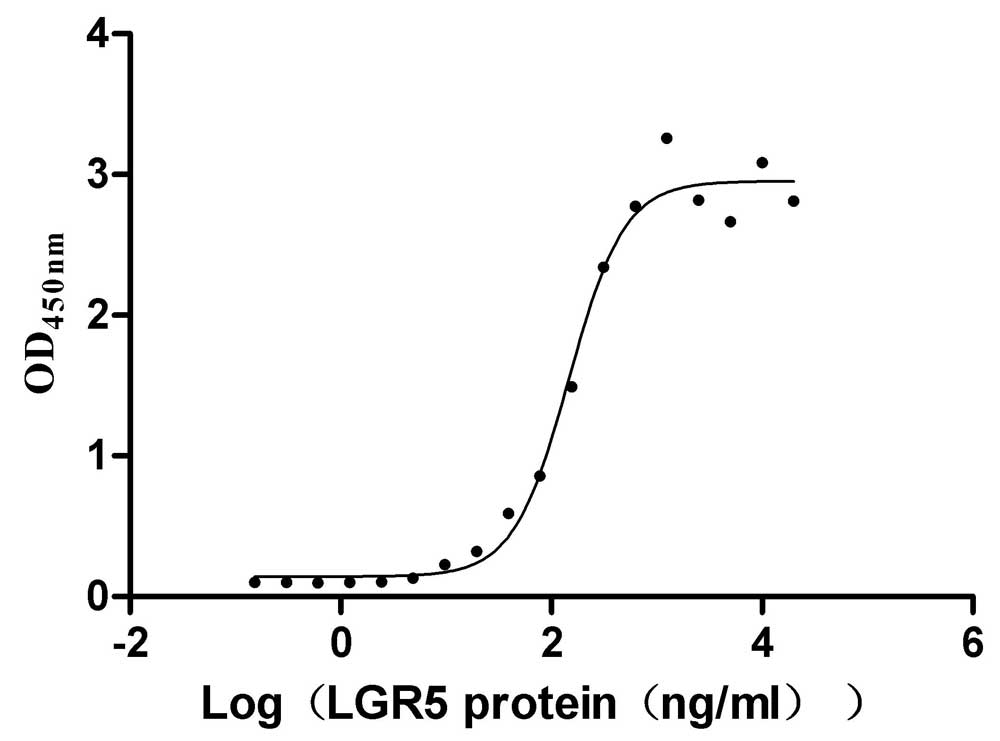
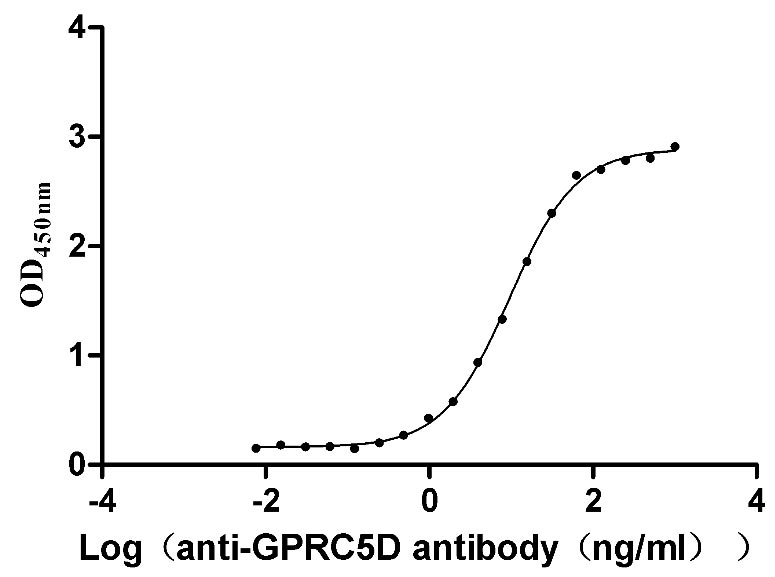
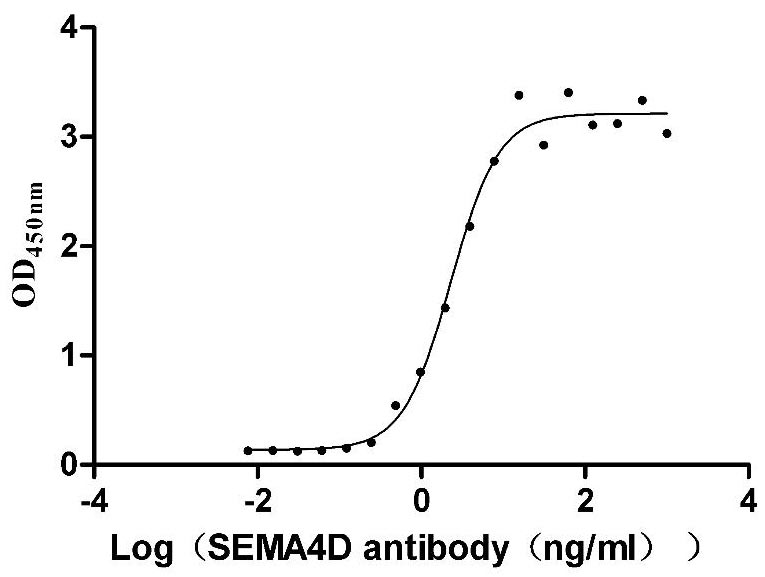
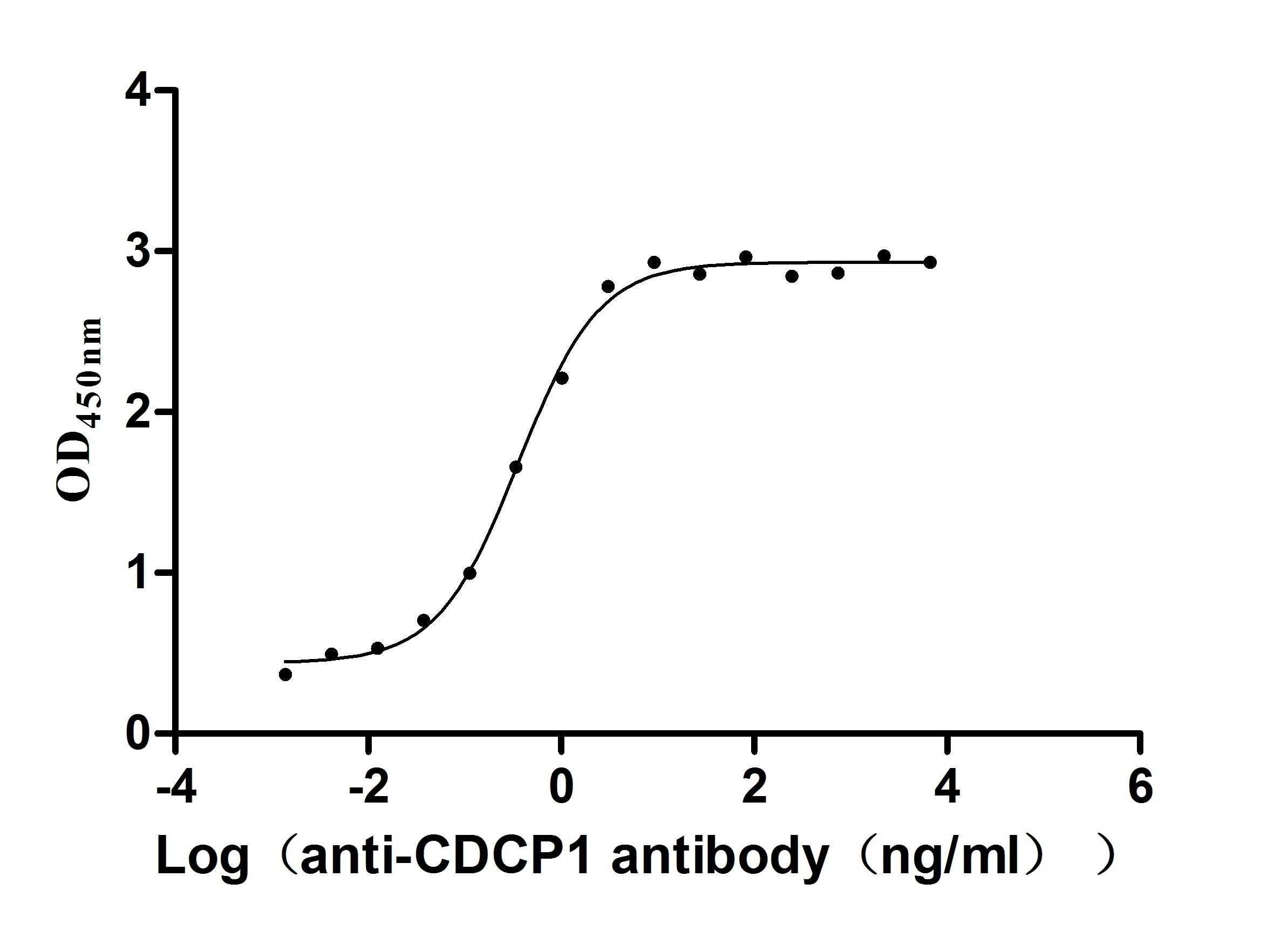
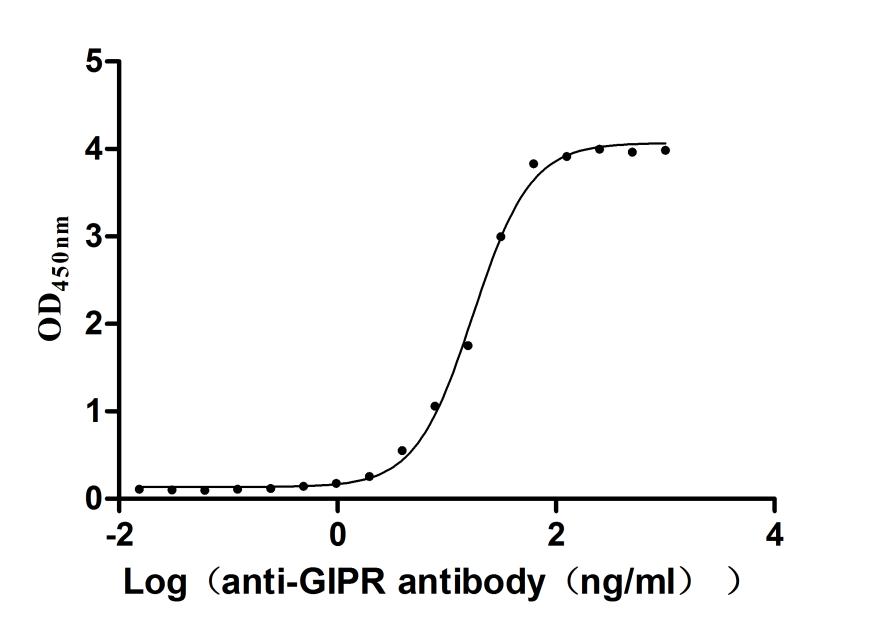
-AC1.jpg)
